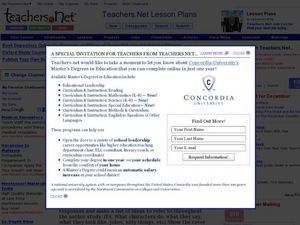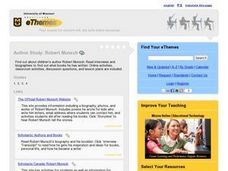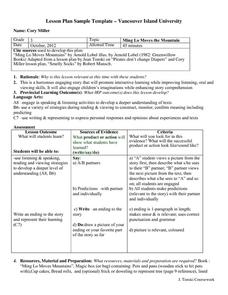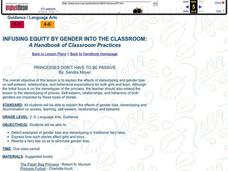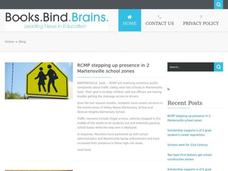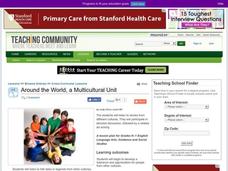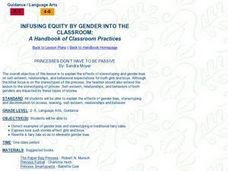Curated OER
Robert Munsch: Author Study
Students study Robert Munsch's style of writing. In this literature instructional activity, students read many of Robert Munsch's books, write a list of the characteristics found in his books, and write or orally tell a story using some...
Curated OER
Munsch mania
Third graders choose a Robert Munsch poem to interpret. In this language arts lesson, 3rd graders interpret their chosen poem by either acting it out or through illustrations. Once the interpretations are complete, students send their...
Museum of Disability
Zoom!
Turn your class' focus on how wheelchairs assist individuals with disabilities to become more independent with this disabilities lesson plan. Scholars listen to a read aloud of the book, Zoom! by Robert Munsch, answer questions about key...
Curated OER
Author Study: Robert Munsch
Students use the Internet to access information about author Robert Munsch and his many books. They read biographies and book reviews and complete word searches, worksheets, etc.
Curated OER
Moira's Birthday by Robert Munsch
Students use their listening skills to hold up signs every time they hear specific words in the story Moira's Birthday. In this listening skills lesson plan, students have to pay close attention to listen for key words.
Vancouver Island University
Ming Lo Moves the Mountain
A good story is a great way to support skills that are necessary for encouraging strong reading skills. Here is a class I do, You do, We do style lesson that stars the tale, Ming Lo Moves the Mountain. Included are two fun pre-reading...
Curated OER
Princesses Don't Have to be Passive
Students rewrite a fairy tales to eliminate any gender bias that occurs in the original fairy tale. In this gender bias lesson plan, students also discuss how gender bias effects self esteem, relationships, and behaviors.
Curated OER
Building A Bug Bungalow
Learners chart how milkweed bugs grow and change. In this growth and life stages lesson, students read two stories and discuss how and why things grow. Learners brainstorm what can be measured about humans, review and discuss life...
Curated OER
Treaties
Students talk about making promises. In this family life lesson, students listen to the story A Promise is a Promise by Robert Munsch and talk about what a promise is. This is part of a unit on how families take care of each other.
Curated OER
Author Study
Young scholars work collaboratively to create PowerPoint presentations on an author of their choice. This lesson is written for a first and third grade joint project with students pairing up across grade levels.
Curated OER
It's All in the Family with Mother's & Father's Day
Students interview family members to make a family tree for a Mother's or Father's Day card. In this family tree lesson plan, students read Love You Forever and discuss love within families. Students view Genealogy Resources on the...
Curated OER
Around the World, A Multicultural Unit
Students investigate Native American tribes through their stories. In this cultural instructional activity, students read stories of the Inuit tribe and discuss the themes, people, and customs. Students illustrate a picture of the...
Curated OER
Valentine's Day Booklet
Learners create a Valentine's Day booklet. In this creating a book lesson, students write and illustrate their own book describing love.
Curated OER
PRINCESSES DON'T HAVE TO BE PASSIVE
Students learn the effects of stereotyping and discrimination.
Curated OER
Not Just Words
Young scholars work to improve their oral expression while reading aloud. They read and record an entire story with a partner and listen to the playback of the readings. They evaluate their expressive language using a given checklist.


